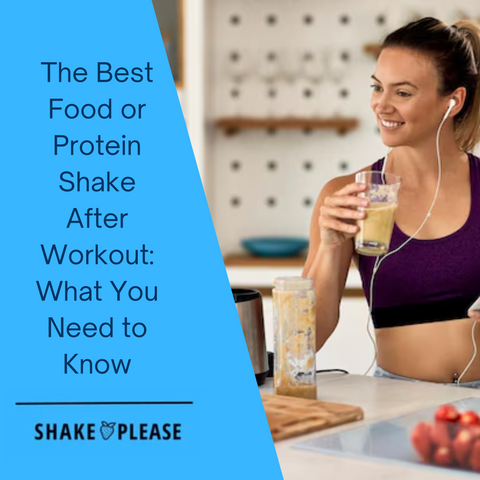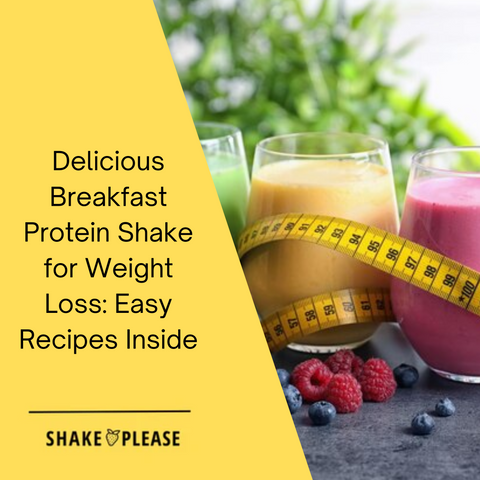
Understanding Post-Workout Nutrition
Proper post-workout nutrition is essential for maximizing the benefits of exercise, supporting muscle recovery, and replenishing energy stores. The right balance of protein and carbohydrates can enhance muscle growth, reduce soreness and muscle strength, and prepare the body for the next workout session.
1. The Role of Food in Workout Recovery
Food acts as energy source and fuel for exercise and plays a crucial role in post-workout recovery by:
-
Replenishing Glycogen Stores: Carbohydrates restore depleted glycogen levels, ensuring the body has energy for future activity.
-
Supporting Muscle Repair: Protein provides amino acids needed for muscle recovery and growth.
-
Preventing Fatigue: Nutrients from whole foods aid in overall recovery and prevent excessive fatigue after intense workouts.
2. Assessing Your Post-Workout Needs
The amount of nutrition needed after a workout depends on several factors:
-
Workout Intensity & Duration: A longer, more intense workout requires more protein and carbohydrates for recovery.
-
Timing of the Next Workout: If training sessions are spaced closely together, refueling with protein and carbs becomes even more important.
-
Individual Goals: Those looking to build muscle may require more protein, while endurance athletes may need a higher carb intake.
3. Are Protein Shakes Necessary After a Workout?
While protein shakes are a convenient option, some research suggests when eating they aren’t always essential. Whole foods can provide the same nutrients, but shakes offer:
-
Quick Digestion & Absorption: Protein shakes deliver nutrients faster than whole foods, making them ideal for rapid recovery.
-
Convenience: They are easy to prepare and consume, especially when on the go.
-
Consistent Protein Intake: For those struggling to get enough protein from whole foods, shakes help fill the gap.
For a quick, high-protein option, try the Chocolate Peanut Butter Banana Protein Smoothie, packed with protein and essential nutrients to fuel muscle recovery.
The Benefits of Eating Protein After a Workout
Protein plays a crucial role in muscle recovery and growth after exercise. When you work out, muscle fibers undergo stress and breakdown, requiring essential amino acids to repair and strengthen. Consuming an adequate amount of protein after a workout ensures that your body has the necessary nutrients to optimize recovery and muscle gains and enhance performance.
1. Muscle Repair and Growth
-
Exercise triggers muscle protein breakdown, and consuming protein post-workout provides the amino acids needed for repair.
-
Eating protein consistently throughout the day enhances muscle recovery and promotes lean muscle growth.
-
Studies suggest that post-workout protein consumption improves body composition by preserving lean muscle while reducing body fat.
2. Improved Exercise Performance
-
Protein intake before and after workouts supports sustained energy levels and reduces muscle soreness.
-
It helps maintain muscle mass, which is crucial for endurance and strength-based training.
3. How Much Protein Should You Consume?
-
The International Society of Sports Nutrition recommends consuming 20-40 grams of protein every 3-4 hours to maximize muscle protein synthesis.
-
Protein intake for 24 hours after exercise plays a key role in muscle repair and growth, making post-workout meals an essential part of recovery.
For a convenient, high-protein option, try the Vanilla Berry Protein Smoothie, which provides a delicious and effective way to refuel after exercise.
Choosing the Right Protein Source
Not all proteins are created equal—selecting a high-quality protein source can impact recovery, weight loss and muscle development.
1. Complete Protein with Essential Amino Acids
-
A protein source containing all essential amino acids is ideal for post-workout nutrition.
-
These proteins support muscle protein synthesis and improve recovery efficiency.
2. Whole Food Protein Sources
For those who prefer real whole food sources over supplements, these are excellent choices:
-
Chicken breast – Lean, high in protein, and low in fat.
-
Turkey breast – Another lean protein option packed with muscle-building nutrients.
-
Nuts and seeds – Provide protein, healthy fats, and fiber.
3. Supplemental Protein Options
If whole foods are not an immediate option, supplemental proteins can offer a quick and convenient alternative:
-
Whey Protein Powder – One of the fastest-digesting proteins, perfect for post-workout recovery.
-
Casein Protein Powder – Slower digestion rate, ideal for prolonged muscle repair, especially before bed.
-
Soy Protein Powder – A great plant-based alternative with all essential amino acids.
-
Protein Bars – Portable, high-protein snacks that work well when on the go.
Typically, one scoop of protein powder provides 20-30 grams of protein, making it a convenient option for those looking to meet their daily protein needs.
For a quick and delicious recovery drink, try the Pineapple Berry Protein Smoothie, which combines essential proteins with refreshing flavors to help replenish and refuel your body efficiently.
Post-Workout Meal and Snack Ideas
Eating the right foods after a workout plays a crucial role in muscle recovery, replenishing energy stores, and preparing your body for future exercise. A well-balanced post-workout meal or snack should contain a combination of protein and carbohydrates to promote muscle repair and replenish glycogen levels.
1. Light Meal and Snack Options for Recovery
If you're not ready for a full meal immediately a few hours after your workout, opt for a light meal or snack to kickstart recovery:
-
Banana with almond butter – Provides natural sugars to restore glycogen and healthy fats for sustained energy.
-
Low-fat yogurt with whole grain cereal – A perfect blend of protein, carbs, and probiotics for digestion.
-
Whole wheat English muffin with sliced turkey breast – A balanced combination of lean protein and complex carbs.
2. Smoothies for Easy Digestion
For individuals who find solid food hard to digest post-exercise, a fresh fruit and yogurt smoothie can be a great alternative. Blending protein, fruits, and yogurt creates an easily digestible, nutrient-packed beverage.
3. Protein Shakes for Quick Recovery
When short on time, a protein shake can be a convenient way to meet post-workout nutrition needs, especially when protein bars combined with carbohydrates for optimal recovery. Try the Chocolate Peanut Butter Banana Protein Smoothie for a delicious and effective recovery shake.
The Role of Carbohydrates in Post-Workout Nutrition
Carbohydrates are essential for post-workout recovery, as they help replenish glycogen stores—the body’s main source of fuel during an exercise session. The need for carbs post-workout depends on the intensity and duration of exercise session and your activity.
1. Why Carbs Matter Post-Workout
-
After exercise, your muscles deplete glycogen stores, which need to be restored for energy and muscle function.
-
The rate of glycogen depletion varies based on workout intensity. High-intensity workouts burn through glycogen faster than lower-intensity sessions.
2. Daily Carbohydrate Intake Recommendations
-
The International Society of Sports Nutrition recommends consuming 3.6-5.5 grams of carbohydrates per pound of body weight daily to maintain energy and recovery.
-
Endurance athletes and individuals with high training volumes may require higher carbohydrate intake to sustain performance.
3. Combining Protein and Carbs for Better Recovery
-
Pairing protein and carbohydrates post-workout enhances glycogen synthesis, promoting faster recovery and muscle repair.
- A protein shake with fruit is an easy way to consume both nutrients simultaneously, ensuring quick absorption and replenishment.
A Guide to Protein, Carbs, and Fats In Smoothies
For a refreshing, carb-balanced protein shake, try the Pineapple Berry Protein Smoothie, which provides the perfect blend of protein, fruit, and natural sugars for glycogen replenishment.
The Benefits of a Protein Shake After a Workout
Protein shakes are a convenient and effective way to supplement post-workout nutrition, helping you reach your fitness goals whether you're building muscle, losing weight, or maintaining general health.
1. Protein Shakes as a Nutritional Supplement
-
Protein shakes help bridge dietary gaps, ensuring you meet your daily protein requirements.
-
Whether you're aiming for muscle growth or weight loss, a well-balanced protein shake can support your fitness goals by providing essential nutrients.
2. How Much Protein Do You Need?
-
The recommended daily protein intake is 0.8 grams per kilogram of body weight (or about 20 grams per meal).
-
If you’re looking to build muscle, you may need 1.2-2.0 grams per kilogram of body weight, almost double the recommended daily amount.
3. The Best Time to Drink a Protein Shake
-
Timing matters when consuming protein shakes for optimal results.
-
Pre-workout: Helps fuel your workout by providing sustained energy and amino acids.
-
Post-workout: Helps support muscle recovery and growth, replenishing the nutrients lost during exercise.
By incorporating protein shakes into your pre workout and post-workout routine, you maximize recovery, enhance muscle repair, and sustain long-term fitness goals.
Putting It All Together: A Post-Workout Nutrition Plan
Creating an effective post-workout nutrition plan ensures that your body receives a balanced meal with the nutrients it needs to recover, rebuild muscle, and maintain energy levels for future workouts. Here’s how to structure your post-workout meal for optimal results:
1. Consume 20-40 Grams of Protein Within 1-2 Hours Post-Workout
-
The window for muscle recovery is most effective within one to two hours after exercise.
-
Aim for 20-40 grams of protein from high-quality sources to support muscle repair and synthesis.
-
A quick and convenient post-workout shake, like the Vanilla Berry Protein Smoothie, provides an easy way to hit your protein goals.
2. Include Carbohydrates to Replenish Energy Stores
-
Carbs help restore glycogen levels, which are depleted after exercise.
-
Opt for whole grains, fruits, or starchy vegetables to pair with your protein source.
-
A protein shake with fruit or a meal with rice, potatoes, or oats helps balance recovery.
3. Adjust Protein Intake Based on Hunger and Activity Level
-
If you feel extremely hungry post-workout, you may need a larger portion of protein and carbs.
-
If you’re not very hungry, a lighter option like a protein shake can still supply the necessary nutrients.
-
Listen to your body and adjust intake accordingly.
4. Keep Eating Protein Throughout the Day
-
Spreading protein intake evenly throughout the day optimizes muscle growth and recovery.
-
Incorporate lean meats, dairy, eggs, nuts, and plant-based proteins into your meals.
-
Supplement with protein shakes or snacks as needed.
Common Mistakes to Avoid in Post-Workout Nutrition
Even with the best intentions, certain post-workout nutrition mistakes can slow progress. Avoid these pitfalls:
1. Not Consuming Enough Protein
-
Protein is essential for muscle recovery. Without enough, the body struggles to rebuild and strengthen muscle fibers.
-
Aim for at least 20-40 grams of protein post-workout to maximize muscle synthesis.
2. Skipping Carbohydrates
-
Carbs replenish glycogen stores, which fuel your next workout.
-
Avoid low-carb post-workout meals, as they can lead to fatigue and decreased performance.
3. Not Staying Hydrated
-
Dehydration affects muscle recovery, energy levels, and overall performance.
-
Drink water or electrolyte-rich beverages to replenish lost fluids.
4. Ignoring Hunger Signals
-
Failing to adjust intake based on activity level and hunger can stall recovery.
-
Listen to your body and increase or decrease portions as needed.
Top Muscle Gain Best Protein Powder: Build Muscle Effectively
Maximizing Muscle Growth and Recovery
To build and maintain muscle effectively, follow these key guidelines:
1. Consume 1.2-2 Grams of Protein Per Kilogram of Body Weight Daily
-
Adjust protein intake based on your training intensity and goals.
-
Higher protein intake (closer to 2g/kg) is ideal for intense strength training.
2. Incorporate Protein-Rich Foods in Your Diet
-
Lean meats (chicken, turkey, fish, beef)
-
Eggs and dairy products (Greek yogurt, cottage cheese, milk)
-
Plant-based proteins (tofu, lentils, chickpeas, quinoa, nuts, seeds)
3. Consider Adding Protein Powder for Convenience
-
Whey protein is fast-digesting, making it ideal post-workout.
-
Casein protein is slow-digesting, best used before bed to support overnight recovery.
-
Plant-based protein powders cater to vegan or dairy-free diets.
4. Stay Hydrated and Consume Carbs for Optimal Recovery
-
Water supports nutrient transport and muscle function.
-
Carbohydrates restore energy and enhance protein absorption.
By balancing protein intake, hydration, and nutrient timing, you can maximize post-workout recovery and achieve long-term fitness goals efficiently.





